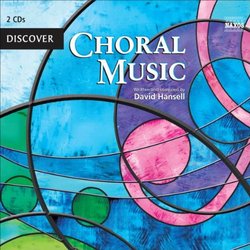A Great Way to Learn More about the History of Choral Music
J Scott Morrison | Middlebury VT, USA | 08/31/2007
(5 out of 5 stars)
"Like other issues in Naxos's 'Discover ...' series, this two CD compilation is really quite excellent. The CDs comprise a tour through five (1490-2000) centuries of choral music and is accompanied by booklet containing a 20,000 word essay written in incisive and extremely clear language by David Hansell, who also compiled the music on the CDs. Hansell's text is full of insights and often includes a lively discussion of the historical and musicological issues involved. There are sub-chapters on such fascinating topics as the evolution from chant to polyphony, special features of Renaissance and Reformation choral music, the birth of oratorio, the classical period, the rebirth of plainsong in the 19th century, the Russian choral tradition, the choral symphony, twentieth century developments, the 'reinvention of the past' in the late twentieth century, national and regional style, and more. Each of the recorded excerpts is a complete movement from a choral work and all the performances are good. Such groups as The Sixteen, the Nova Schola Gregoriana, the Cambridge Singers, the Oxford Camerata, Le Concert Spirituel, the Stuttgart Gächinger Kantorei, the San Diego Master Chorale and the Elora Festival Singers, among others, are featured. Choral conductors include John Rutter, Noel Edison, Steuart Bedford, Michel Piquemal, Jeremy Summerly, Harry Christophers and others. Music included ranges from Gregorian chant through music by Victoria, Taverner, Byrd, Monteverdi, Schütz, Purcell, Bach, Handel, Haydn, Mendelssohn, Bruckner, Fauré, Brahms, Berlioz, Mahler, Poulenc, Vaughan Williams, Britten, Pärt, and others.
Also included in the booklet are a glossary of terms (e.g. antiphon, canon, homophonic, melisma, mode, parody mass, pedal note, te deum) and a very detailed timeline of five centuries of choral music that relates choral works to historical events and concurrent works of art and literature. Did you know, for instance, that the King James Version of the Bible was published the same year as Monteverdi's Vespro della beata Vergine? Or that Mozart's Requiem was written in the same decade that the Rosetta Stone was discovered, the American Bill of Rights adopted and Thomas Paine's 'Rights of Man' and Blake's 'Songs of Experience' published?
I can easily imagine this issue being valued by schools and libraries, by adults who have embarked on a course of self-study in the arts, and by inquisitive and musically inclined children above, say, the age of 10. The super-budget price cannot be beaten.
Strongly recommended for its intended audience.
Scott Morrison"

